What Is Mobile Device Management and How to Remove MDM
If you get a smartphone or tablet from a specific organization or enroll your device through vendor-specific programs, chances are that your iPhone or Android phone is locked by MDM. In fact, mobile devices have become ubiquitous in education and business use. Businesses and schools rely on mobile devices for a wide assortment of tasks. Furthermore, as working remotely becomes prevalent, mobile devices have become an integral part of organizations for productivity and efficiency. This guide explains what MDM is.
PAGE CONTENT:
Part 1. What Is MDM
MDM stands for Mobile Device Management. It is the administration of mobile devices including smartphones, tablets, and more. MDM first emerged in the early 2000s. The solution enables organizations to secure, monitor, manage, and enforce policies on employees’ or students’ mobile devices.
It is usually a deployment of a combination of on-device applications and configurations, organization policies and certificates, and backend infrastructure for the purpose of simplifying and enhancing the IT management of end users’ devices.
Many organizations administer devices and applications with MDM products and services. In addition to data segregation, MDM also deals with securing emails and documents, enforcing corporate policies, and managing mobile devices.
The management tasks available with MDM are endless, but some of the common uses include:
1. Deploy supported apps in bulk and configure them as required.
2. Provide effective troubleshooting and offer remote assistance for users anywhere.
3. Monitor and track mobile devices, their status, and data access.
4. Perform remote erase and factory reset commands that prevent data from being compromised if devices become lost or stolen.
5. Implement policy-based management to uphold compliance with regulatory requirements.
6. Manage apps on whitelist and blacklist, distribute new apps and updates, and remove unsecured apps.
7. Protect mobile devices and data from malware with encryption enforcement including VPN configuration.
8. Track device location via GPS, cellular signal, and internet connection.
In short, MDM is able to secure emails, documents, browsers, and app catalogs on mobile devices. MDM comes with MAM (mobile application management), mobile identity management, and mobile content management.
Part 2. Why MDM Is Important
As a category of security software, MDM solutions focus on IT security and device management. The major goal is to optimize the operation and security of mobile devices within an organization.
1. Increase productivity. With an MDM solution, the IT administrator can accomplish app updates and other tasks at the touch of a button. It brings productivity across a range of industries. MDM ensures that work and private life on mobile devices remain separate. Organizations can always stay productive.
2. Reduce IT costs. The majority of organizations with an MDM solution report a good ROI. It can save you on IT costs because the management looks after all mobile devices including data security and IT support. That reduces IT resource costs effectively.
3. Enhance network and data security. An MDM solution includes a comprehensive mobile device policy as part of an overall cybersecurity strategy that outlines the organization’s acceptable use of smartphones and tablets including IT security, data protection, and app usage guidelines. Plus, the policy can be regularly reviewed by IT, security, and business stakeholders.
4. Streamline device management remotely. Administrators can use MDM to quickly configure new employees’ mobile devices. Moreover, it is a convenient way to manage all enrolled mobile devices using a single web console. In addition, administrators can control and manage geolocation, data usage, and more devices within the network.
5. Control app installation and update. With an MDM solution, administrators can control the app blacklist and whitelist. In other words, members can only install the apps on the whitelist. Plus, some necessary apps are pre-installed through the MDM solution. Furthermore, administrators can install the app updates for all devices within the network.
6. Offer IT support 24/7. Mobile devices are not perfect and may occur a variety of software errors. Under an MDM solution, members can troubleshoot software issues quickly with constant support as well as recover data after troubleshooting.
7. Train employees. Unlike face-to-face training, mobile devices enable employees to continue their growth anywhere under a cloud-based MDM solution.
8. Deploy tasks to all students. Teachers can also distribute tasks, homework, notifications, and other information to all students through the MDM solutions.
Part 3. How Does It Work
To further understand what MDM is, let’s talk about how it works. An MDM solution usually contains two separate components. One side is an MDM server management console, which is stored in an organization’s data center. It allows administrators to configure, manage, and enforce policies. The other side is an MDM agent that receives and implements these policies on all mobile devices within the network.
Part 4. How Can You Use MDM
The workflow to use MDM includes a few steps, including enrollment and configuration profiles, supervision, payloads, and declarations. We introduce the complete workflow of using MDM below.
Step 1. Enroll with MDM
The organization-owned devices can automatically enroll in MDM through the serial numbers. iPhones and iPad, for example, can enroll in MDM using Automated Device Enrollment or Device Enrollment. User-owned devices can enroll using User Enrollment.
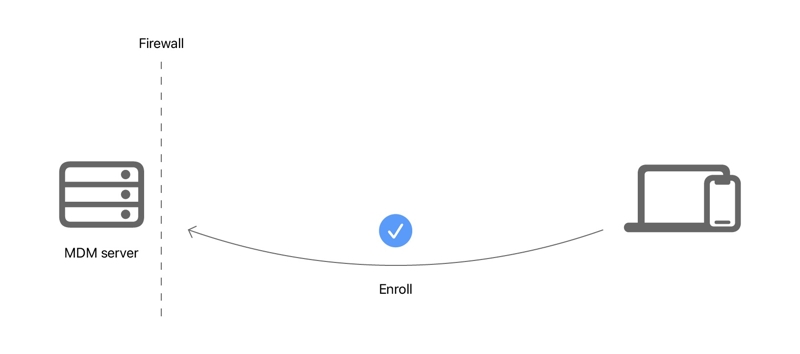
Step 2. Install MDM Profile
During the enrollment process, the devices download and install the MDM profile. If it is not automatically installed, the MDM administrators can install the profile manually.
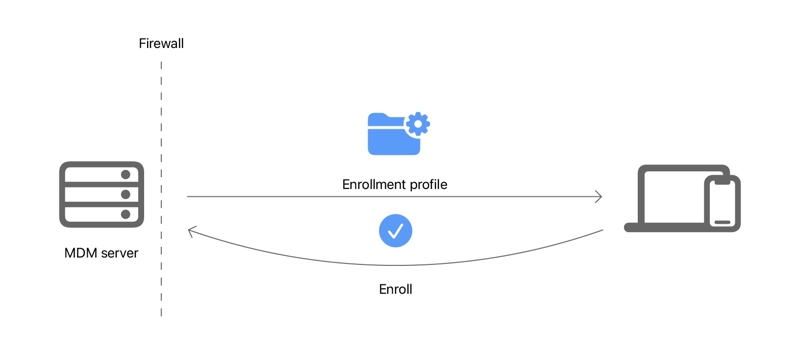
Step 3. Notify the Device
Next, the MDM server queues up a command for the devices and sends a notification. Then MDM maintains persistent communication with devices across public or private networks.
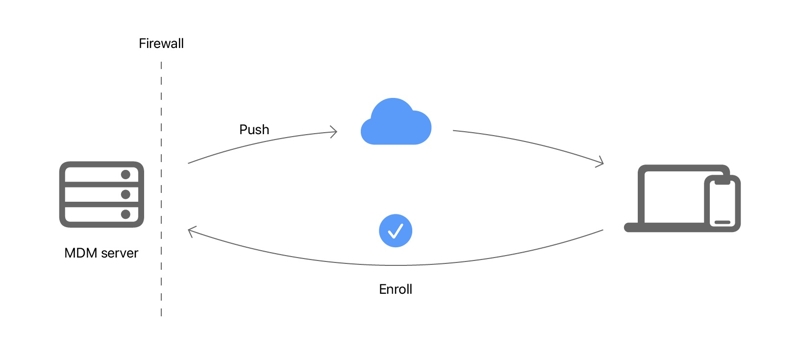
Step 4. Contact the Server
Once devices receive the notification, they can contact the MDM server too.
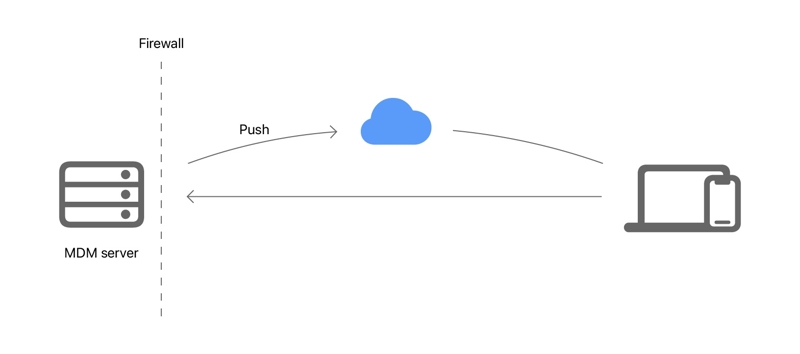
Step 5. Deliver Content
Now, the mobile devices are connecting to the MDM server. Administrators can install apps, app update, and send information on the queued command.
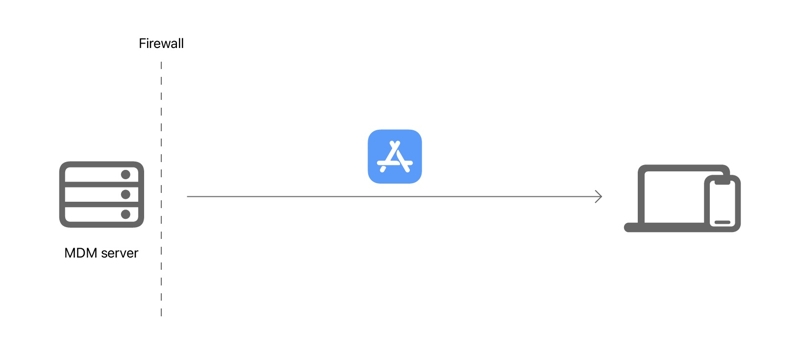
Step 6. Declarations
Declarations are payloads that represent policies the MDM server defines and sends to devices. The declarations include four types, configurations, assets, activations, and management.
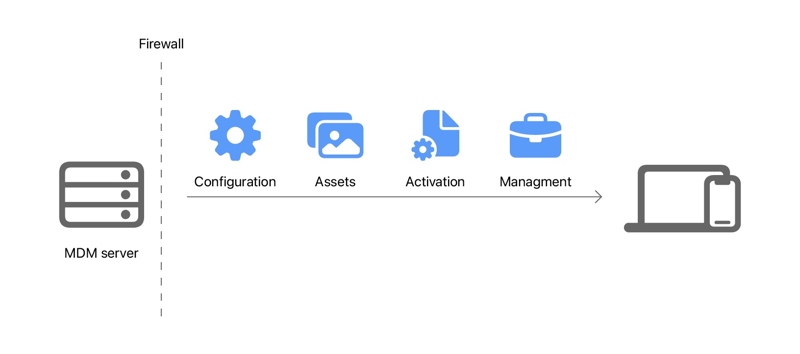
Part 5. Remove MDM from Android and iPhone
If you have left an organization or graduated, you might want to remove MDM from your device to increase flexibility and use it for personal purposes without restrictions. We explain how to remove MDM Mobile Device Management.
How to Remove MDM from Android in Settings
You can remove the MDM agent from your Android phone and unlock the restrictions. However, it may require the permission of the administrator or verification code during the removal process.
Step 1. Open the Settings app from your app tray, scroll down, and go to Lock Screen and Security, Security, or the relevant option.
Step 2. Next, choose the Other security settings option, and then tap Device Administrators.
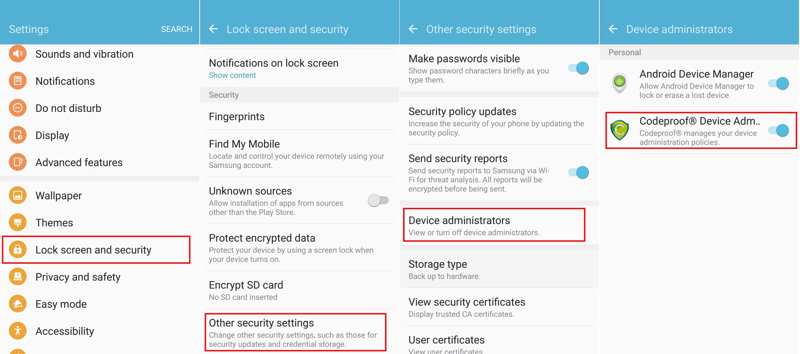
Step 3. Find the MDM administrator profile, and toggle off the switch. If prompted, read the warning message, and tap OK to confirm it.
Step 4. You also need to uninstall the MDM agent from your Android. Go back to the Settings app.
Step 5. Head to the Applications tab, choose Applications Manager, and tap the MDM agent app.
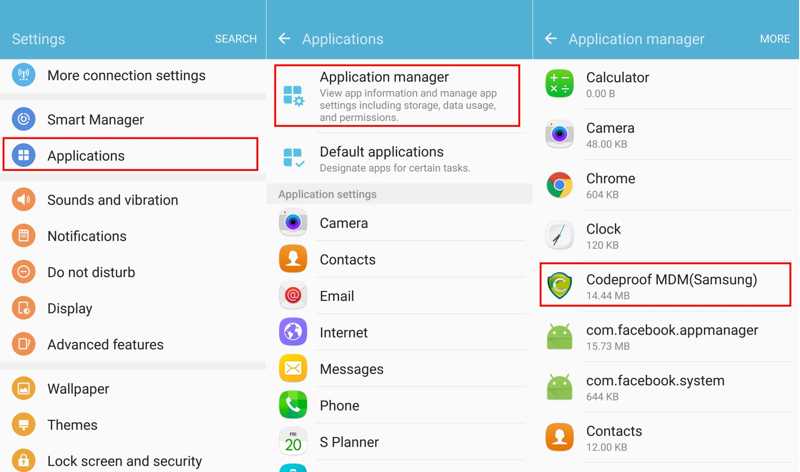
Step 6. At last, press the Uninstall button to remove MDM from your Android device.
How to Remove MDM from Android by Factory Reset
If you cannot find the MDM profile or agent on your device, you might need to factory reset Android. Bear in mind that the factory reset is not available to all Android devices locked by MDM.
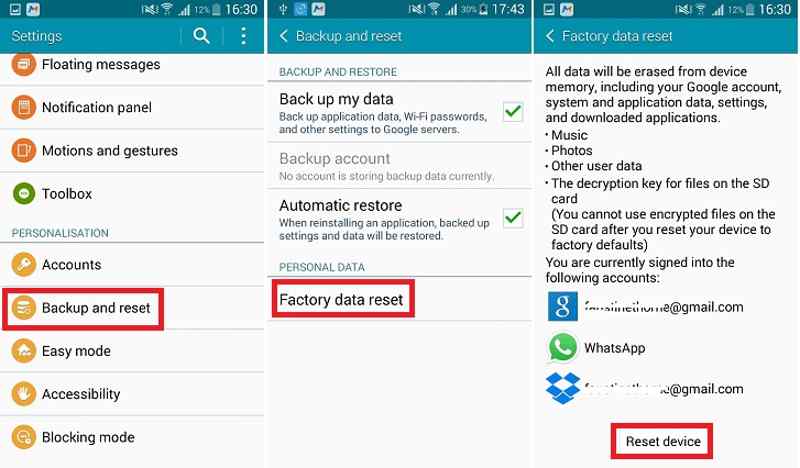
Step 1. Run the Settings app.
Step 2. Scroll down and choose Backup and reset.
Step 3. Next, tap Factory data reset, read what data will be erased, and press the Reset device button. If prompted, enter your Android password or Gmail account credentials.
Tips: If these ways cannot remove MDM on your phone, ask the IT administrator to delete your device from the MDM server.
How to Remove Apple MDM from iPhone/iPad
After the contract, you can remove Apple MDM from your iPhone or iPad in the Settings app. This way requires the permission of MDM administrators and your iPhone passcode. Here is the workflow.
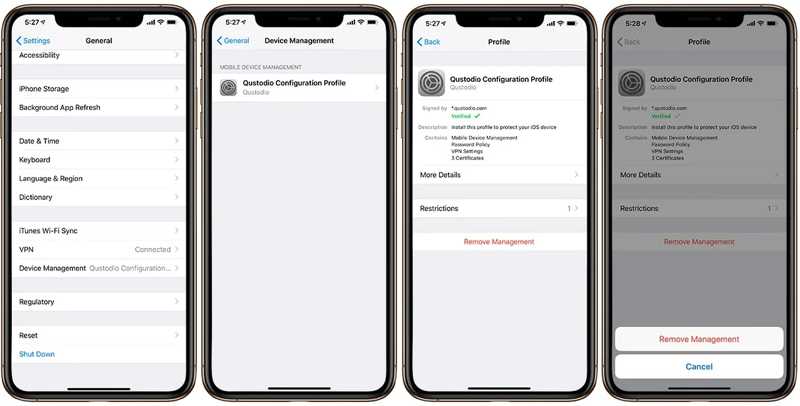
Step 1. Open your Settings app from your iPhone home screen.
Step 2. Go to the General tab, and choose Device Management or Profiles & Device Management.
Step 3. Then you will see the MDM profile that has been installed on your iOS device under the Mobile Device Management section. Then tap the profile, and press the Remove Management button.
Step 4. When prompted, enter your iPhone passcode, and then tap the Remove Management button to confirm it. If you forget your iPhone passcode, you should recover it with your combined phone number or email.
How to Remove Apple MDM from iPhone Without Permission
Not all MDM profiles can be found in the Settings app. If you have a school or a company iOS device that by default has an MDM profile built in, for instance, the way above won’t work. Moreover, if the MDM administrators don’t permit it, you cannot get rid of MDM either. Apeaksoft iOS Unlocker can help you to bypass MDM profiles in such cases. In other words, it allows you to remove MDM from your iPhone or iPad without permission or other restrictions.
The Best Way to Bypass Apple MDM from iPhone Without Permission
- Remove the MDM profile from any iOS device with one click.
- Available to a company or school iPhone or iPad.
- Won’t erase your data and personal settings on your device.
- Offer bonus features, like passcode removal.
- Support the latest versions of iOS.
Secure Download
Secure Download

Here are the steps to bypass Apple MDM from your iPhone without permission:
Step 1. Detect your iPhone
Launch the best MDM removal tool after you install it on your PC. It is compatible with Windows 11/10/8/7/XP/Vista. There is another version for Mac OS X 10.7 or above. Next, connect your iPhone to your PC with a Lightning cable. The software will recognize your device immediately.
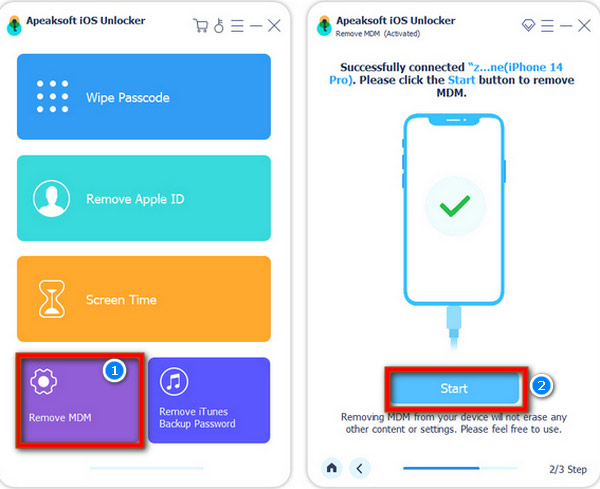
Step 2. Disable Find My
If Find My iPhone or Find My iPad is disabled on your device, skip to the next step. If it is turned on, you will get the on-screen instructions to show you how to disable Find My. Follow the prompts to disable Find My iPhone or Find My iPad.
Step 3. Bypass MDM
Once you are ready, click on the Start button to begin bypassing MDM on your iPhone or iPad. It may take a while, and you must keep your iPhone and computer linked during the process. When it is done, your iOS device will restart automatically.
Conclusion
This comprehensive guide explained what MDM meaning is, its benefits, how MDM works, and how to get rid of it. You can follow our narration to learn this service in detail. Of course, you are able to remove MDM from your Android phone or iPhone after the contract. Apeaksoft iOS Unlocker is the ultimate solution to bypass MDM on your iOS device without any restrictions. If you have other questions about this topic, please feel free to leave a message below this post.
Related Articles
In this post, we will share five easy methods to turn off or break the Screen Time limits without a password and without parents knowing.
Have you ever looked for a way to unlock your iPhone with broken screen? This post shares 5 easy but effective ways to achieve it!
Download free iPhone Unlockers to bypass the passcode without being stuck in the Activation lock, remove Apple ID of activated iPhones, and bypass Screen Time.
If your iPhone or iPad is locked by your previous school or company, you can follow our step-by-step guide to bypass MDM easily.

